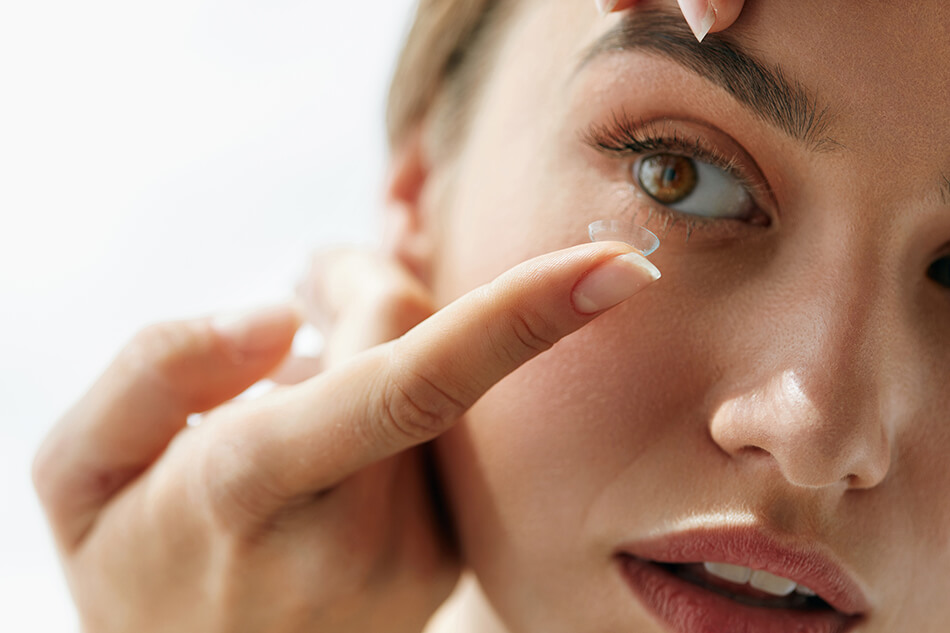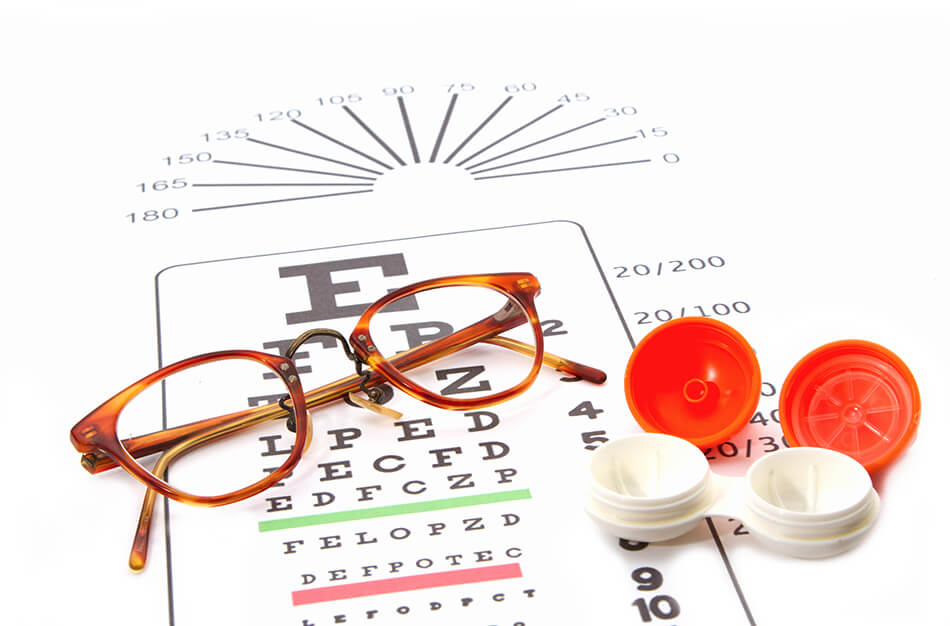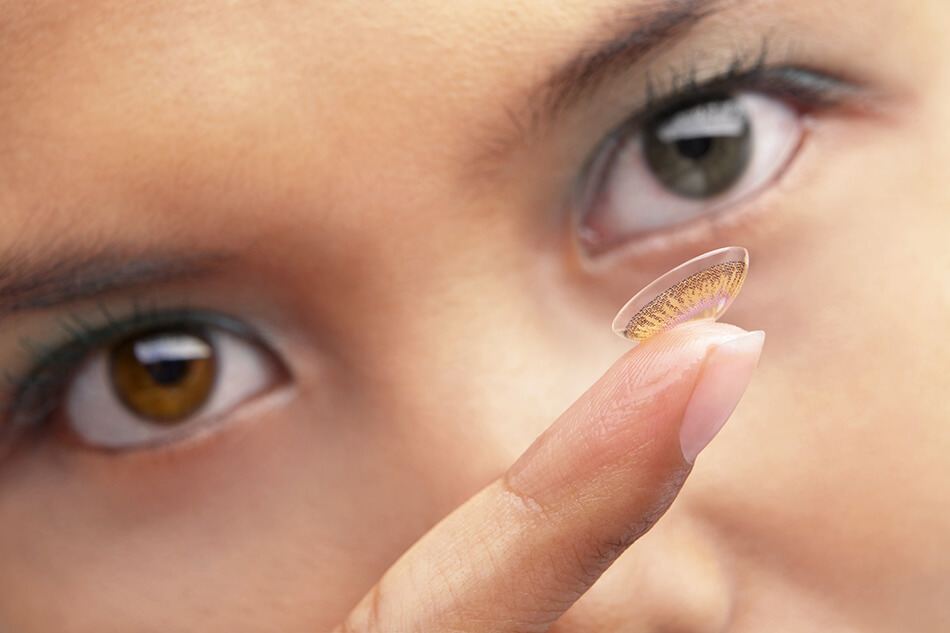Pros and Cons of Wearing Contact Lenses vs. Glasses
The battle between contact lenses vs. glasses may seem like a new concept. Just poke around chat forums and you’ll find loads of questions about the pros and cons of both. Simply put, some people prefer glasses and don’t see the benefits in contacts. While others discover great convenience from contact lenses or believe they look more attractive in them.
However, the battle began in the 1880s when contacts were invented. No, that’s not a typo! Despite many obstacles and unpopularity at first, inventors persisted. They believed the battle between contact lenses and eyeglasses was well worth fighting.
The History of Glasses

When glasses were first invented, they were only available for farsightedness.
Yep, that's right. If you were nearsighted back then, a pair of convex glasses wouldn't do you any good. Convex was the only material available to make glasses at the time. Elderly scholars used convex lenses to magnify print for reading and writing.
By contrast, concave lenses for nearsightedness weren't invented until much later. This wasn't a big deal because most people only noticed their vision impairment at an older age, through age-related eye conditions. Presbyopia is an example of such condition that can surface after the age of 40. Things up close begin to look blurry simply because of our natural aging process.
The History of Contact Lenses

Contact lenses are a popular alternative to prescription eyeglasses. They're great to wear while playing sports or for cosmetic purposes. Like glasses, contact lenses correct refractive error. Refractive error refers to a change in eye shape that causes blurry vision.
The first pair of contacts fit onto a pair of human eyes in the late 1800s. However, because it was made of blown glass, and covered the eyeball entirely, it was very painful to wear. What’s even worse, is it was harmful to the eyes. This is because, unlike other bodily organs, eyes get their oxygen directly from the air. Therefore, covering your eyeballs with glass shields is, in essence, suffocating them.
However, despite unpopularity, inventors persisted and tried many variations of the first eye-ball suffocating lens.
Thank goodness the advent of plastic led to contacts in the 40s that were much easier to wear. Still, we’ve come a long way since then! And after soft contact lenses were introduced in the early 70s, comfort and wearability just keeps improving every year.
Advantages & Disadvantages of Contact Lenses vs. Glasses
When deciding which one is right for you, it’s best to remember that neither choice is superior to the other. Each one offers their own set of advantages and disadvantages. It is up to you to decide which fits your lifestyle, aesthetic, and budget more.
When evaluating contact lenses vs. glasses, consider the convenience of each option.
In general, glasses have less upkeep than contact lenses, but also less risk. It's not a big deal if you forget to clean the lenses on your glasses.
However, if you neglect to clean and care for your contact lenses, you risk causing permanent damage to your eyes.
The good news? Thanks to advancements in science and technology, the risk of issues is slim, as long as you take care of your contacts. The invention of daily disposable contact lenses is an example of such an advancement. This type of lens offers the ultimate convenience, while requiring zero maintenance.

Contact Lenses vs. Glasses for Your Lifestyle
When choosing contact Lenses vs. glasses, consider the activities that you participate in on a regular basis.
Do you live an active lifestyle? Does your job ask that you wear protective eyewear? Do you enjoy spending time outdoors? These questions will help you decide which one is better for you.
Pros: Contact lenses
Contacts allow users to feel as though they no longer suffer from a vision impairment. Without the weight of the frames, you are free to move around without worrying that your glasses will fall off.
Cons: Eyeglasses
On the other hand, glasses can sometimes interfere with your field of vision. For example, when you look out of the corner of your eye, you'll most likely see part of the frame of your glasses as well. Contact lenses don't have that issue since the lens is transparent.
Glasses are also prone to fogging up if you get caught in the rain or when you go from a cold to a hot environment. On the flip side, they can protect your eyes from dust and debris in the air.
Pros: Eyeglasses
Eyeglasses are often seen as a better choice for people who stare at a computer screen often. Prolonged screen usage can lead to increased eye strain and eye dryness. Even with the use of lubricating drops, eyeglasses are more comfortable than contact lenses for heavy computer users. Same goes for people with allergies or unusual eye irritations—glasses are often the safer choice.

The Aesthetics of Contact Lenses vs. Glasses
Both glasses and contacts can help you show off your style. Eyeglasses weren't always considered stylish, but they're gaining popularity now. Celebrities are opting for fashion glasses, even when they have perfect vision. Many different brands have even launched their own eyewear collections.
However, with the debut of color contact lenses, you can instantly enhance or change the color of your eyes. Costume lenses can even transform the appearance of your eyes to look supernatural.
The thing that draws people to contact lenses is how often you can replace them. You could change up the color of your eyes every day, if you wanted, to match your mood or outfits.
Since glasses are more expensive, most people will only have one or two pairs at a time. If you're somebody who likes to switch up your style, you may enjoy the freedom of contact lenses.
Cost of Contact Lenses vs. Glasses
Contact lenses can end up costing you more than eyeglasses, if you wear dailies, since they're replaced so often. To save some money, you can buy contact lenses in six or even twelve month quantities. Just be sure to check in with your eye care practitioner to keep your prescription up to date.
More often than not, you can't return contact lenses simply because you’ve changed your mind about them. However, you can ask your optometrist to let you try various samples until you find the right one for you.
There you have it! The pros and cons of glasses vs. contact lenses. Now you can make an informed decision about which is best for you. Maybe you’ll even get both!